Ted Cruz to tap Carly Fiorina as running mate

Republican presidential contender Ted Cruz has tapped former technology executive Carly Fiorina to serve as his running mate. The Texas senator plans to unveil his pick for vice president Wednesday afternoon in Indianapolis. That’s according to a Republican with direct knowledge of Fiorina’s selection, who spoke on condition of anonymity because the person was not authorized speak before the official announcement. “Carly is bright, knowledgeable, brings great financial expertise and she’s a woman,” said Gary Aminoff, the Los Angeles County co-chair of the Cruz campaign. Aminoff said he had also been told Fiorina was Cruz’s choice. The 61-year-old Fiorina, a former chief executive of Hewlett-Packard, has been a prominent Cruz ally since shortly after abandoning her own presidential bid earlier in the year. She was the only woman in the Republican Party’s crowded 2016 field. “Of all the people who didn’t make it far in the race, she was one of the best about laying out her plan, talking about who she is and her accomplishments,” said Doug De Groote, a fundraiser for Cruz based near Los Angeles. It was an unusual move for a candidate who is far from becoming his party’s presumptive nominee, but Cruz is desperate to generate momentum for his struggling campaign. The fiery conservative was soundly defeated by GOP front-runner Donald Trump in all five primaries contests on Tuesday, and he’s been mathematically eliminated from winning the nomination before his party’s national convention in July. Some Cruz allies praised the selection of Fiorina, but privately questioned if it would change the trajectory of the race. Trump has won 77 percent of the delegates he needs to claim the nomination, and a win next week in Indiana will keep him on a firm path to do so. Cruz was to appear Wednesday afternoon with Fiorina in Indiana’s capital city, having staked his candidacy on a win in the state’s primary contest next Tuesday. Fiorina’s California ties could also give Cruz a big boost in that state’s high-stakes primary on June 7. “Carly has incredible appeal to so many people, especially in California,” De Groote said. “She can really help him here.” Her first major foray into politics was in 2010, when she ran for Senate in California and lost to incumbent Sen. Barbara Boxer by 10 percentage points. She has never held elected office. Trump criticized a Fiorina pick as “ridiculous” and “dumb” even before it was announced. “First of all, he shouldn’t be naming anybody because he doesn’t even have a chance,” the New York billionaire said in a Wednesday interview on Fox News. “Naming Carly’s dumb, because Carly didn’t do well. She had one good debate — not against me by the way, because I had an unblemished record of victories during debates — but she had one victory on the smaller stage and that was it,” Trump said. He added, “She’s a nice woman. I think that it’s not going to help him at all.” Throughout her presidential bid, Fiorina emphasized her meteoric rise in the business world. A Stanford University graduate, she started her career as a secretary, earned an MBA and worked her way up at AT&T to become a senior executive at the telecom leader. She was also dogged by questions about her record at Hewlett-Packard, where she was hired as CEO in 1999. She was fired six years later, after leading a major merger with Compaq and laying off 30,000 workers. Democrats quickly attacked the Cruz-Fiorina alliance. “The best way to describe that ticket is mean and meaner,” said Sen. Barbara Boxer, D-Calif., who beat Fiorina for Senate in 2010. “He wants to throw people out of the country and she threw thousands of jobs out of the country. Perfect match.” In an Associated Press-GfK poll conducted in December 2015, Republican voters were more likely to say they had a favorable than an unfavorable view of Fiorina by a 47 percent to 20 percent margin, with 32 percent unable to give a rating. Among all Americans, 45 percent didn’t know enough about Fiorina to rate her, while 22 percent rated her favorably and 32 percent unfavorably. By contrast, both Cruz and Trump have high negative ratings even within their own party, according to an April AP-GfK poll. Among Republican voters, 52 percent have a favorable and 41 percent have an unfavorable opinion of Cruz, while 53 percent have a favorable and 46 percent have an unfavorable opinion of Trump. Among all Americans, 59 percent had an unfavorable opinion of Cruz and 69 percent said that of Trump. Republished with permission of the Associated Press.
Donald Trump pulls off clean sweep of 5 Northeast primaries
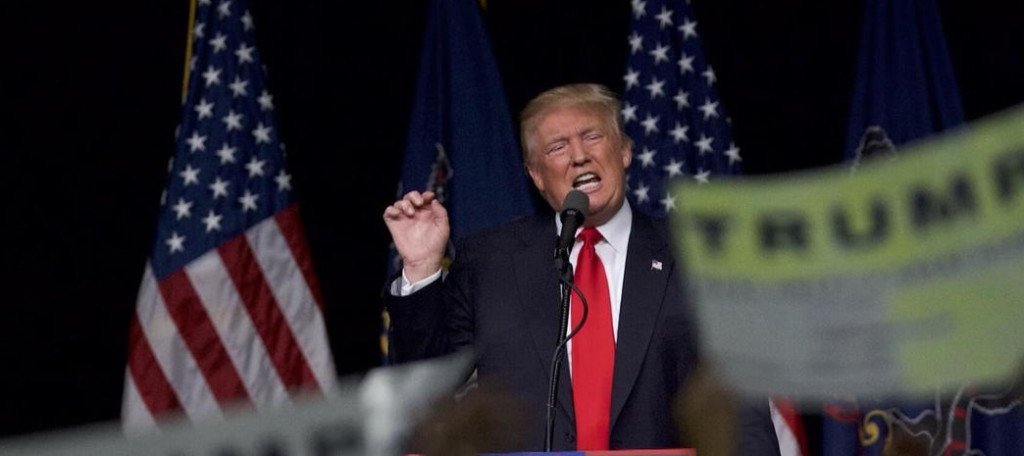
Donald Trump swept all five Republican primaries Tuesday, a commanding showing across the Northeast that keeps the Republican front-runner on his narrow path to the GOP nomination. Hillary Clinton carried Democratic contests in Maryland and Delaware, the start of what her campaign hoped would be a strong night for the former secretary of state. Trump’s victories came in Maryland, as well as Connecticut, Delaware, Pennsylvania and Rhode Island. His strong showing was a blow to rivals who are running out of ways to stop the brash billionaire. Clinton aimed to emerge from Tuesday’s contests on the brink of becoming the first woman nominated by a major party. She’s already increasingly looking past rival Bernie Sanders, even as the Vermont senator vows to stay in the race until primary voting ends in June. Sanders spent Tuesday campaigning in West Virginia, where he drew several thousand people to a lively evening rally. He urged his supporters to recognize that they are “powerful people if you choose to exercise that power.” Still, there were some signs that Sanders’ campaign was coming to grips with his difficult position. Top aide Tad Devine said that after Tuesday’s results were known, “we’ll decide what we’re going to do going forward.” Trump’s victories padded his delegate totals, yet the Republican contest remains chaotic. The businessman is the only candidate left in the three-person race who could possibly clinch the nomination through the regular voting process, yet he could still fall short of the 1,237 delegates he needs. GOP rivals Ted Cruz and John Kasich are desperately trying to keep him from that magic number and push the race to a convention fight, where complicated rules would govern the nominating process. The Texas senator and Ohio governor even took the rare step of announcing plans to coordinate in upcoming contests to try to minimize Trump’s delegate totals. But that effort did little to stop Trump from a big showing in the Northeast. Cruz spent Tuesday in Indiana, which votes next week. Indiana is one of Cruz’s last best chances to slow Trump, and Kasich’s campaign is pulling out of the state to give him a better opportunity to do so. “Tonight this campaign moves back to more favorable terrain,” Cruz said during an evening rally in Knightstown, Indiana. His event was held at the “Hoosier gym,” where some scenes were filmed for the 1986 movie, “Hoosiers,” starring Gene Hackman as the coach of a small-town Indiana basketball team that wins the state championship. Trump has railed against his rivals’ coordination, panning it as “pathetic,” and has also cast efforts to push the nomination fight to the convention as evidence of a rigged process that favors political insiders. Yet there’s no doubt Trump is trying to lead a party deeply divided by his candidacy. In Pennsylvania, exit polls showed nearly 4 in 10 GOP voters said they would be excited by Trump becoming president, but the prospect of the real estate mogul in the White House scares a quarter of those who cast ballots in the state’s Republican primary. In another potential general election warning sign for Republicans, 6 in 10 GOP voters in Pennsylvania said the Republican campaign has divided the party — a sharp contrast to the 7 in 10 Democratic voters in the state who said the race between Clinton and Sanders has energized their party. The exit polls were conducted by Edison Research for The Associated Press and television networks. With his three victories Tuesday, Trump will win at least half of the 118 delegates up for grabs in Tuesday’s contests. And he has a chance to win a lot more. In Pennsylvania, Trump collected 17 delegates for winning the state. An additional 54 delegates are elected directly by voters — three in each congressional district. However, their names are listed on the ballot with no information about which presidential candidate they support. Those delegates will attend the GOP convention as free agents, able to vote for the candidate of their choice. Democrats award delegates proportionally, which allowed Clinton to maintain her lead over Sanders even as he rattled off a string of wins in previous contests. According to the AP count, Clinton has 1,946 delegates while Sanders has 1,192. That count includes delegates won in primaries and caucuses, as well as superdelegates — party insiders who can back the candidate of their choice, regardless of how their state votes. Clinton’s campaign is eager for Sanders to tone down his attacks on the former secretary of state if he’s going to continue in the race. She’s been reminding voters of the 2008 Democratic primary, when she endorsed Barack Obama after a tough campaign and urged her supporters to rally around her former rival. Ahead of Tuesday’s results, Senate Democratic leader Harry Reid said that while Sanders has run a “unique and powerful” campaign, he does not believe the Vermont senator will be the party’s nominee. According to exit polls, less than a fifth of Democratic voters said they would not support Clinton if she gets the nomination. The exit polls were conducted in Connecticut, Pennsylvania and Maryland. Republished with permission of the Associated Press.
What’s the deal? Voters cheer, jeer, shrug off GOP pact
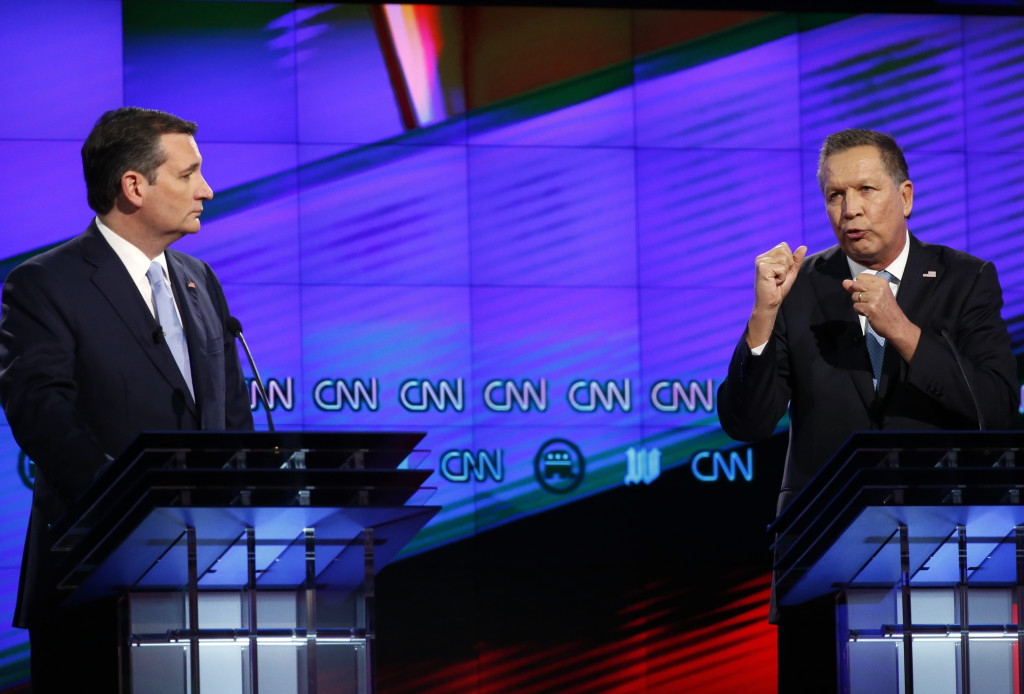
Kathy Hiel said she hadn’t made up her mind to vote for Donald Trump — until the billionaire businessman’s two Republican White House rivals formed an extraordinary political non-aggression pact to stop him. “I’ll have to support him now,” said Hiel, an Elizabeth, Indiana, resident who designs cabinets for a home interior company. While the political world waits to see if Texas Sen. Ted Cruz and Ohio Gov. John Kasich‘s alliance proves brilliant or desperate, some voters in the three states most affected applauded the move while others panned it. But many were still struggling to understand what, if anything, it will mean for them. Kasich says he won’t compete in Indiana, where Cruz is boasting he’s “all-in,” while the Texas senator said he will cede contests in Oregon and New Mexico to Kasich — an agreement both candidates hope will keep Trump from winning the 1,237 delegates needed to secure the GOP presidential nomination at the party’s national convention in Cleveland beginning July 18. Hiel was first in line to see Cruz at an ice cream parlor he visited in Columbus, Indiana, on Monday, and aggressively pressed the Texan as he stepped off his campaign bus on the convention’s delegate-selection process. She said she was a Ron Paul delegate to the 2012 Republican convention, and that she had doubts about Cruz because he’s lately been more focused on winning delegates to Cleveland than wooing voters around the country. Then came word late Sunday of Cruz’s agreement with Kasich — and Hiel said that sealed her decision. “I never did fully trust Ted,” she said. But 28-year-old Iraq war veteran Michael Thielmeier, who attended an earlier Cruz rally in Borden, Indiana, called the agreement “smart, calculated, knowledgeable.” He said he didn’t expect to see such a cooperative deal between two rivals since Cruz has built his career in the Senate and his presidential campaign around being a troublemaker who has infuriated the establishment in both parties. Thielmeier said he still supports Cruz, because he doesn’t see the pact with Kasich as an insider political move. In Oregon, 66-year-old Craig Herman said the agreement “doesn’t bother me at all.” “It’s all theater,” said Herman, from Oregon City. “I think they all do this for drama and put out press releases.” The deal may not hold together long term since Kasich said his supporters in Indiana should still vote for him. At a pizzeria in Greenwood, Indiana, where Cruz also stopped Monday, some voters asked him to autograph a mailer his campaign sent out before the agreement that made Kasich look soft on guns. A few attendees wondered aloud what it meant since the pair were now supposed to be friends. Donald Trump didn’t provide much clarity, blasting the deal as collusion while also gleefully saying it showed how weak Cruz and Kasich are. Denise Lombardo, a registered nurse who attended a Trump rally Monday at a hockey arena in Wilkes-Barre, Pennsylvania, said she plans to vote during Tuesday’s state primary for the first time in her life — for Trump. “I feel that Cruz and everyone else is just jealous because he tells it like it is,” Lombardo, from West Pittston, Pennsylvania, said of Trump. Langston Bowens, a student at the University of New Mexico, said he was planning to vote for Kasich and said of the deal with Cruz: “I think we can stop (Trump) before we get to the nomination process.” Ed Kasados, a 78-year-old resident of Los Ranchos de Albuquerque, New Mexico, said he’ll likely vote for Kasich, but will ultimately support whoever is the Republican nominee. He summed up the Cruz-Kasich pact in a single word: “Silly.” Republished with permission of the Associated Press.
Donald Trump bristles at Ted Cruz-John Kasich collaboration
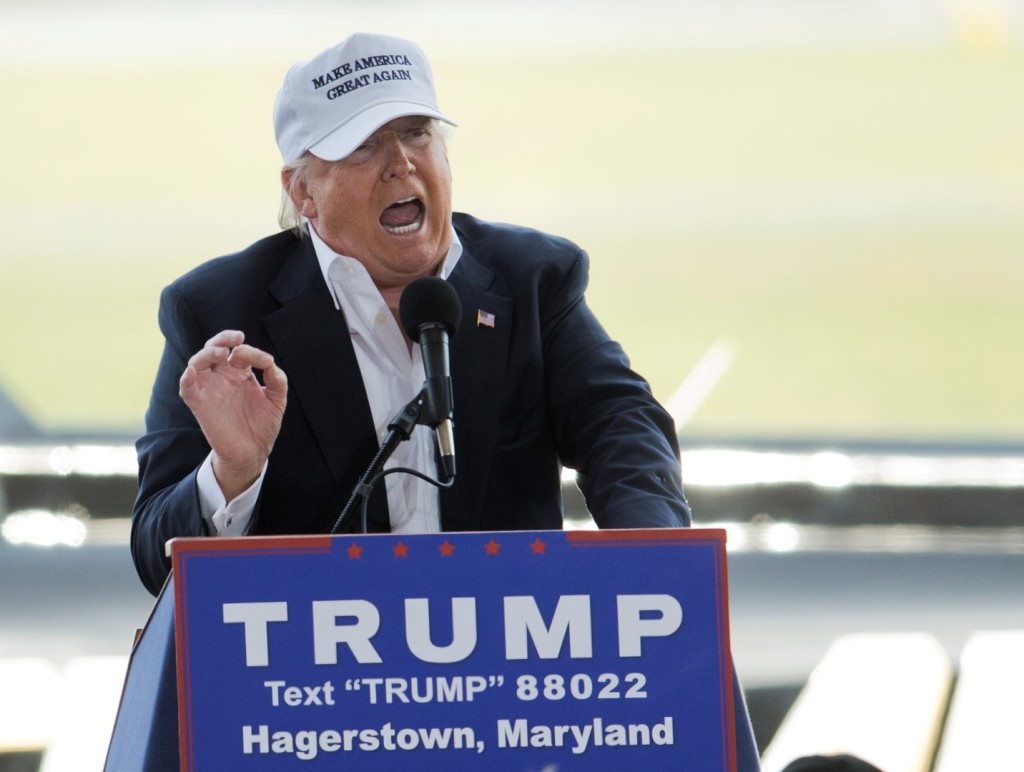
Donald Trump says an extraordinary collaboration between Ted Cruz and John Kasich aimed at unifying the anti-Trump vote in some remaining primaries is a desperate move by “mathematically dead” rivals. Such collusion would be illegal in many industries, the Republican presidential front-runner said, but it’s illustrative of “everything that is wrong in Washington and our political system.” Under the arrangement outlined Sunday, Kasich, the Ohio governor, will step back in the May 3 Indiana contest to let Cruz bid for voters who don’t like Trump. Cruz, a Texas senator, will do the same for Kasich in Oregon and New Mexico. The arrangement does not address the five Northeastern states set to vote Tuesday, where Trump is expected to add to his already overwhelming delegate lead. Yet the shift offers increasingly desperate Trump foes a glimmer of hope in their long and frustrating fight to halt the billionaire’s rise. Trump said in a statement the Cruz-Kasich compact joins two “puppets of donors and special interests” who have no path to the nomination. Cruz’s campaign manager, Jeff Roe, said in a statement explaining the new plans that Trump would be soundly defeated by the Democratic nominee, whether it’s Hillary Clinton or Bernie Sanders. “Having Donald Trump at the top of the ticket in November would be a sure disaster for Republicans,” he said. Added Kasich’s chief strategist, John Weaver, “Our goal is to have an open convention in Cleveland, where we are confident a candidate capable of uniting the party and winning in November will emerge as the nominee.” The announcement marks a sharp reversal for Cruz’s team, which aggressively opposed coordinating anti-Trump efforts with Kasich as recently as late last week. And the agreement applies only to Indiana, Oregon and New Mexico — three of the 15 states remaining on the Republican primary calendar. As Kasich backs out of Indiana, Cruz promised he would not compete in Oregon on May 17 and New Mexico on June 7. Trump campaigned Sunday in Maryland, which will vote on Tuesday along with Rhode Island, Connecticut, Pennsylvania and Delaware. Speaking to several thousand people in an airplane hangar in Hagerstown, Maryland, Sunday evening, Trump stressed repeatedly that he expects to win the 1,237 delegates needed in the first round of voting in Cleveland to stave off a contested convention. “I only care about the first,” he said. “We’re not going for the second and third and fourth and fifth.” As recently as three days ago Kasich’s campaign announced investments in Indiana, including the opening of two offices and the creation of a campaign leadership team. His campaign on Sunday night canceled a town-hall meeting and gathering in Indianapolis scheduled to watch the results of Tuesday’s primaries. Both campaigns encouraged allied super PACs and other outside groups to “honor the commitments.” On the Democratic side Sunday, underdog Sanders rallied thousands of voters in two New England states and offered mixed signals on how hard he would push his differences with the commanding front-runner, Clinton. The Vermont senator largely steered clear of Clinton at a Rhode Island park, but hours later delivered a sharp critique before more than 14,000 supporters in New Haven, Connecticut. Sanders reiterated his call for Clinton to release transcripts of lucrative Wall Street speeches she delivered after leaving the State Department in early 2013. Republished with permission of the Associated Press.
Ted Cruz, likable guy? He’s working on that
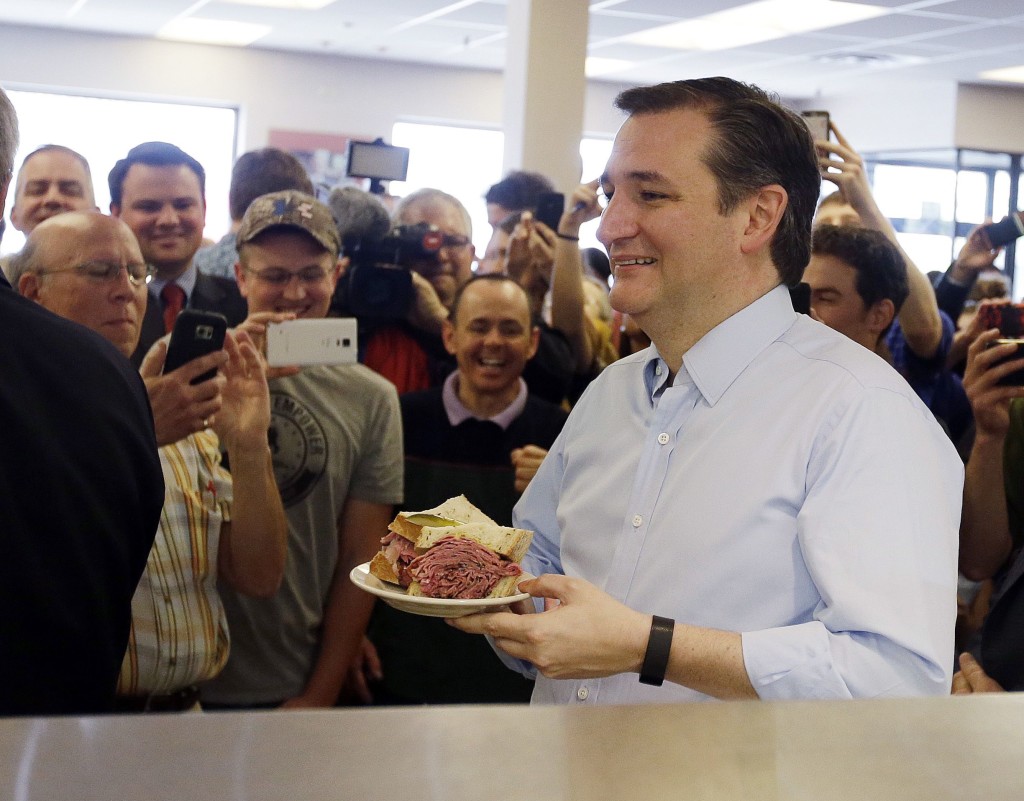
After spending a year campaigning as a hardened, uncompromising conservative, Ted Cruz wants voters to see him in a different light. Cruz’s presidential campaign is embarking on a concerted effort to highlight a more affable version of the fiery Texas Republican. He’s started working the late night talk show circuit, a new forum for the senator, and his wife, Heidi, has also been appearing more often on national TV to present him as a likable figure. Cruz’s two young daughters, who have already provided occasional comic relief to their dad’s campaign, will be joining the senator on the road frequently. And his team is looking for more opportunities to put Cruz in fun, laid-back settings, like when he joined kids for a matzo-making lesson in New York. “It’s important for us to show him in more of a lighthearted venue,” said Alice Stewart, Cruz’s communications director. She conceded that voters want more than just a candidate they agree with on policy, adding, “It’s not a secret that voters will vote for someone they like.” The lengths Cruz has to go in boosting his standing with voters were starkly evident in a focus group of Republican women this week in Pittsburgh. When the women were asked what they knew about Cruz, several described him as “untrustworthy” or a “liar.” GOP front-runner Donald Trump has spent weeks assailing Cruz as “Lyin’ Ted.” And when focus group participants were asked what animal best described Cruz, some said a “mosquito” or a “hornet.” “You just want to bat it away,” one woman said. The session was organized by Public Opinion Strategies and Purple Strategies as part of the “Wal-Mart Moms” series that focuses on female voters. Cruz allies say the senator is warmer than he’s given credit for, particularly in private moments. Rep. Reid Ribble, a Wisconsin Republican who backs Cruz, recalled seeing the candidate playing tag with his daughters backstage before a campaign stop earlier this month. “I remember thinking to myself as I watched him play with his kids, ‘That’s the Cruz America needs to see,’” Ribble said. “The more people can see the humanity of any candidate, the better.” The campaign’s emphasis on Cruz’s persona comes as the senator fights for any possible advantage in his Republican primary fight with Trump. Cruz has no mathematical chance of winning the nomination through the regular voting and is counting entirely on overtaking Trump at a contested convention. Cruz’s campaign has demonstrated impressive deftness in working the convention delegate process. But many party insiders view Cruz with skepticism — his reputation in Washington is that of a self-serving opportunist — and his standing with the public is only a bit better. A recent Associated Press-GfK poll found that only 26 percent of Americans had a favorable opinion of Cruz, while 59 percent were unfavorable. Perhaps the only solace for Cruz is that Trump’s numbers are even worse — 69 percent of Americans view him unfavorably as do 46 percent of Republicans. Cruz’s campaign knows that in order to boost his numbers, he needs to reach out to Americans beyond those who listen to conservative talk radio and know the senator from his fights with Republican leaders on Capitol Hill, including his 21-hour filibuster against President Barack Obama‘s health care law that resulted in a government shutdown. In that effort, Cruz’s campaign sees Obama as someone to emulate. The president has consistently had high personal favorability ratings and mastered the art of courting Americans outside the political arena. Stewart from the Cruz campaign said Obama “may not have checked all the boxes for a candidate in terms of record and accomplishments, but voters liked him.” Cruz this week even parroted Obama’s famous “yes we can” campaign slogan, adopting “yes we will” as his promise to fulfill his campaign pledges. Before the New York primary, Cruz made the rounds of the late-night talk show circuit for the first time, appearing on “Jimmy Kimmel Live” and the “Tonight” show. Cruz is also doing more public events with his wife and daughters. During a CNN town-hall interview, Cruz talked about a recent class picnic where 8-year-old Caroline “got to dress up daddy” in a pink boa and “big goofy-looking underwear.” “It was on a videotape the whole time,” Caroline continued. “Uh oh,” Cruz said, trying to smile. “And now it’s a class video that they’re sending out to all the parents,” she said as her mom and the audience burst into laughter. Cruz quickly tried to change the subject. Republished with permission of The Associated Press.
GOP official rails over effort aimed at nomination rules
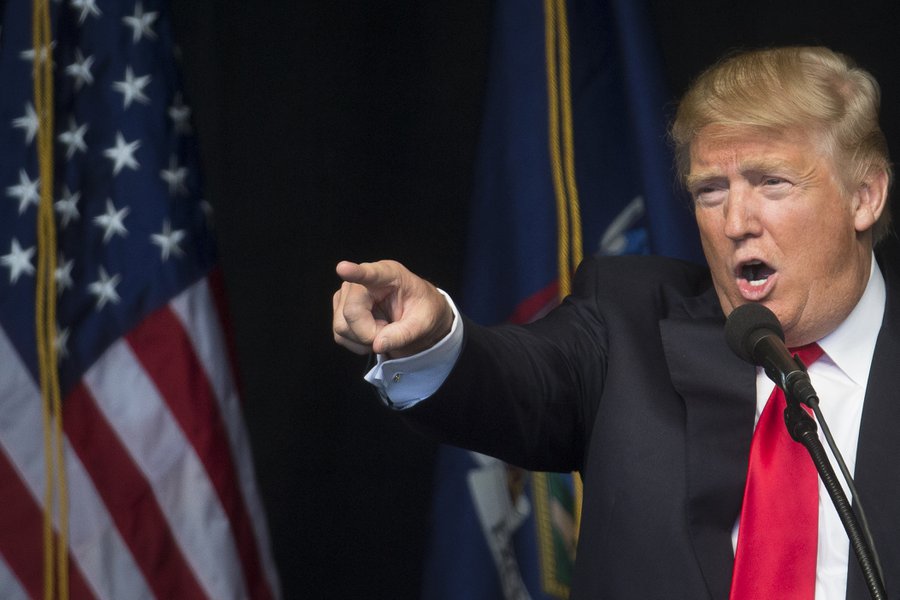
In an extraordinary display of internal discord, the chairman of the Republican Party’s rules committee accused top GOP officials Saturday of “a breach of our trust” by improperly trying to impede a proposed change in bylaws that would make it harder for party leaders to nominate a fresh candidate for president. Bruce Ash, RNC committeeman from Arizona, wrote the harshly worded email to the other 55 members of the GOP rules committee that he chairs. The confidential email, obtained by The Associated Press, was written days before party officials gather in Hollywood, Florida, for preliminary discussions about what rules the GOP will use at its presidential nominating convention this July. Ash wrote the note at a time when some top Republicans consider the party’s two leading presidential contenders, billionaire Donald Trump and Texas Sen. Ted Cruz, to be likely November election losers and have discussed how to replace them with alternatives at the summer convention in Cleveland, Ohio. It is possible that no contenders will have the 1,237 delegates needed to clinch the nomination at that gathering, which would produce the first GOP convention without a presumptive nominee since 1976. Trump has bitterly clashed with party leaders over rules that he claims have been rigged against him, a charge party leaders deny. Ash said he has “become troubled” during discussions with RNC Chairman Reince Priebus and other party officials that by not making the proposed change, GOP officials “could use their power to attempt to achieve a political result” at the nominating convention. He said the convention’s presiding officer could use existing rules to “unilaterally reopen nominations to allow a candidate to be nominated that is viewed as more acceptable, which is exactly what so many rank-and-file Republicans across America fear.” His email did not mention that House Speaker Paul Ryan, R-Wis., is expected to be presiding officer for much of the convention. Some opponents of Trump and Cruz have suggested that Ryan, his party’s 2012 vice presidential candidate, would be a preferable presidential nominee this year, but Ryan has said he doesn’t want to be tabbed. In an email sent hours later, RNC chief counsel John Ryder said the controversial amendment would, in fact, be included among the items given priority consideration when party officials discuss convention rules this week in Florida. But echoing the view of Priebus and some other Republicans on the party’s rules committee, Ryder added, “Major changes now are dangerous and not a good idea, in my humble opinion.” Many Republican leaders have said party officials should not change current convention rules for fear of being accused by the competing presidential candidates of tilting the bylaws to influence the outcome. They have noted that the final decisions on the rules will be made anyway by the convention’s 2,472 delegates, probably on July 18, the gathering’s first day. When Republicans meet in Florida next week to discuss their rules, Oregon RNC committeeman Solomon Yue wants to propose not running full convention meetings under the rules of the House of Representatives, a long tradition. Instead, Yue wants to use Roberts Rules of Order. Yue and others say under the Roberts rules, it would be easier for the convention’s delegates to vote to block an effort by the convention’s presiding officer to consider new nominees for president. Under House rules, the presiding officer has more power to make decisions about the proceedings. Ash said RNC officials have repeatedly asked him and Yue to withdraw Yue’s proposal or even to cancel this week’s GOP rules committee meeting. Ash said he refused. He said that last Thursday, Ryder “convened a rules committee whip call to strategize against and led the opposition to the Yue amendment at the chairman’s request.” He said during that call, RNC officials acknowledged that Yue’s amendment had been “pre-submitted” by a deadline that would give it priority treatment his week. But the next afternoon, Ash said, the RNC sent an email “incorrectly stating” that Yue’s proposed amendment had not been submitted in time to be included in the agenda for next week’s meeting. That would deprive it of priority consideration. “In view of the above, I consider this to be a breach of our trust,” Ash wrote. He added, “In light of this breach and an apparent unwillingness to conduct a proper debate on the amendment, is it prudent for the RNC to continue to give the extraordinary power of the House rules to the presiding officer of the convention, as opposed to the more transparent, democratic and majoritarian rules in Roberts?” Ryder wrote that party officials thought they were following Yue’s desire to circulate his amendment to delegates early next week, even though Yue submitted his proposal in time for the earlier “pre-submission deadline.” “Of course, we wouldn’t have left out Mr. Yue’s amendment from the notice if we thought he wanted it included,” Ryder wrote. Republished with permission of the Associated Press.
How Donald Trump can lock up GOP nomination before the convention
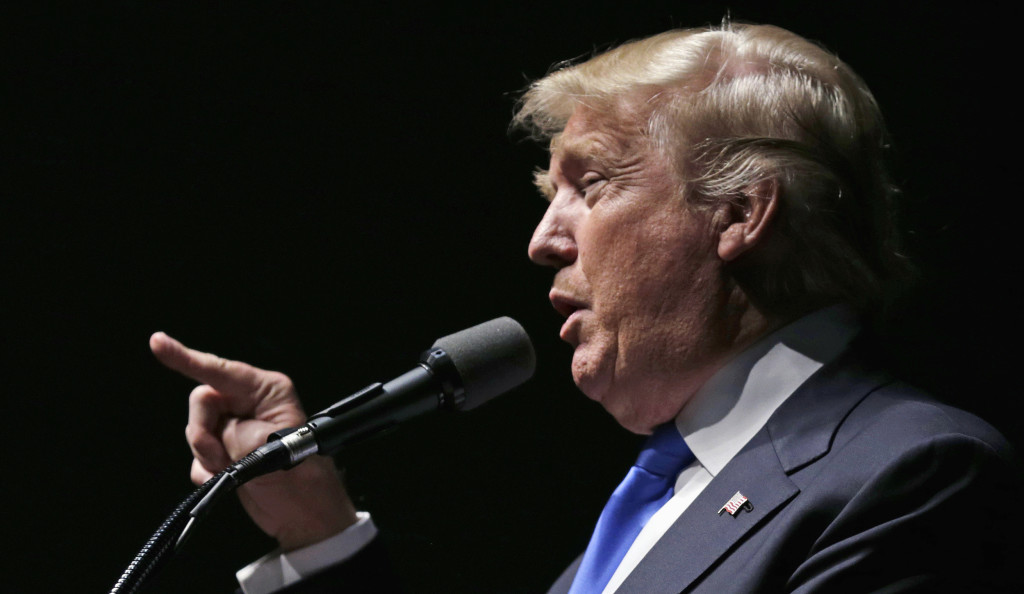
To all the political junkies yearning for a contested Republican convention this summer: not so fast. It’s still possible for Donald Trump to clinch the nomination by the end of the primaries on June 7. His path is narrow and perilous. But it’s plausible and starts with a big victory Tuesday in his home state New York primary. Trump is the only candidate with a realistic chance of reaching the 1,237 delegates needed to clinch the nomination before the July convention in Cleveland. His rivals, Texas Sen. Ted Cruz and Ohio Gov. John Kasich, can only hope to stop him. If Cruz and Kasich are successful, politicos across the country will have the summer of their dreams — a convention with an uncertain outcome. But Trump can put an end to those dreams, and he can do it without any of the 150 or so delegates who will go to the convention free to support the candidate of their choice. What comes next isn’t a prediction, but rather, a way in which Trump could win the nomination outright on June 7. To be sure, Trump will have to start doing a lot better than he has so far. He gets that chance starting Tuesday, beginning the day with 744 delegates. ___ NEW YORK There are 95 delegates at stake in the Empire State, and it’s important for Trump to win a big majority of them. It won’t be easy. There are 14 statewide delegates and three delegates in each congressional district. If a candidate gets more than 50 percent of the statewide vote, he gets all 14 delegates. Otherwise, he has to share them with other candidates. If a candidate gets more than 50 percent of the vote in a congressional district, he gets all three delegates. Otherwise, again, he has to share. Trump leads statewide in the most recent preference polls, with right around 50 percent. New York is a large and diverse state, so he probably won’t win all the congressional districts. Let’s say Trump does make it to 50 percent, but Kasich or Cruz wins five congressional districts; Trump will take 77 delegates on the night. Trump’s running total: 821 delegates. ___ APRIL 26 Five states have primaries on April 26, with 172 delegates at stake: Pennsylvania, Connecticut, Delaware, Maryland and Rhode Island. Pennsylvania could be trouble for Trump. The state has a unique system in which 54 delegates — three from each congressional district — are listed by name on the ballot, with no information for voters to know which candidate they support. That means even if Trump wins Pennsylvania, he’s only guaranteed to claim 17 of the state’s 71 delegates. Connecticut awards 13 delegates to the statewide winner and three to the winner of each congressional district, for a total of 28. The New York real estate mogul needs to win his neighboring state. If he does well, he could get 22 delegates. Delaware’s 16 delegates are winner-take-all, increasing the importance of this small state. If Trump loses Delaware, he has to make it up elsewhere. Maryland awards 14 delegates to the statewide winner and three to the winner of each congressional district, for a total of 38. Recent polls show Trump with a significant lead. If he does well, he could get 32 delegates. Trump can afford to lose Rhode Island, which awards its 19 delegates proportionally. In all, it’s a day on which we’ll say Trump claims 93 delegates. Trump’s running total: 914. ___ MAY Five states hold contests in May, with a total of 199 delegates at stake: Indiana, Nebraska, West Virginia, Oregon and Washington State. Indiana’s May 3 primary is important for Trump. The state awards 30 delegates to the statewide winner and three delegates to the winner of each congressional district, for a total of 57. If Trump can win the state and a majority of the congressional districts, he could collect 45 delegates. West Virginia is another unique state in which voters elect 31 delegates in the May 10 primary. In West Virginia, however, the delegates will be listed on the ballot along with the presidential candidate they support. If Trump does well here, he could pick up 20 or more delegates. Nebraska’s 36 delegates are winner-take-all. But if Nebraska is like its neighbors Kansas and Iowa, two states Cruz won earlier in the race, Trump can’t count on these delegates. Oregon and Washington state award delegates proportionally, so even the losers get some. We’ll give Trump 70 delegates for the month. Trump’s running total: 984. ___ JUNE 7 This could be Trump’s D-Day. Or his Waterloo. Five states vote on June 7, with 303 delegates up for grabs. The biggest prize is California, along with New Jersey, South Dakota, Montana and New Mexico. The only state Trump can afford to lose is New Mexico, which awards 24 delegates proportionally. New Jersey, South Dakota and Montana are winner-take-all, with a total of 107 delegates. California is more complicated, with 172 delegates at stake. The statewide winner gets only 13. The other 159 are awarded according to the results in individual congressional districts. Each of the state’s 53 congressional districts has three delegates. You win the district, you get all three. For Trump to clinch the nomination on June 7 — the last day of the primary season — he has to win a big majority of California’s congressional districts. If he wins 39 districts, he gets 130 delegates. On the last voting day of the primary campaign, we’ll say Trump wins 242 delegates. Trump’s running total: 1,226 — or 11 delegates short of the magic number. ___ OH, WAIT! Missouri has certified the results of its March 15 primary, with Trump beating Cruz by 1,965 votes. If the results survive a potential recount, Trump wins Missouri and another 12 delegates. Trump’s total: 1,238. Cue the balloons. *** Republished with permission of the Associated Press.
Ted Cruz adds 21 delegates with Colorado sweep
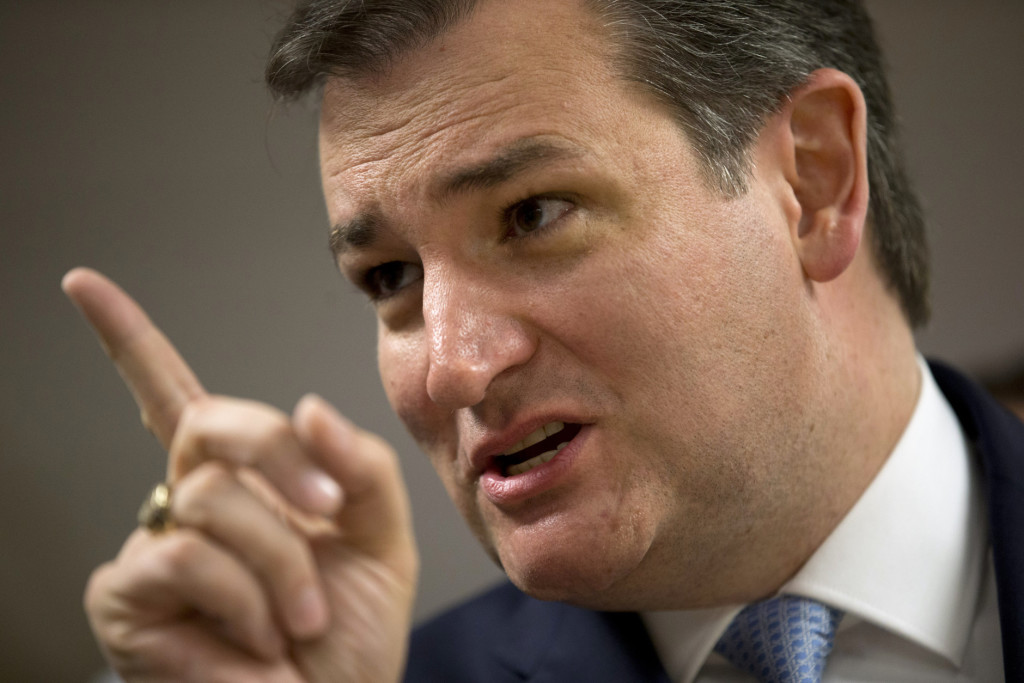
Sen. Ted Cruz continued his Colorado winning streak Friday, locking up the support of 21 total delegates to the Republican National Convention, representing a majority of the delegates Colorado will send to Cleveland in July. Slates loyal to Cruz won every assembly in Colorado’s seven congressional districts, which began April 2 and culminated Friday with 12 delegates selected. The Texas senator is well-positioned to pad his total Saturday, when 13 more delegates will be chosen at Colorado Republicans’ state convention. Of Cruz’s delegates, only 17 were formally pledged to him, and in theory the other four could change their vote in Cleveland. But they were all included on the senator’s slates and are largely state party officials who said they were barred from signing a formal pledge for Cruz but have promised to back him in balloting at the convention. The result shows how Cruz’s superior organization has helped him as he tries to catch up with front-runner Donald Trump. While Cruz’s campaign spent months recruiting slates of delegates and securing pledges, Trump only this week hired a Colorado state director. Two candidates Trump’s campaign told backers to support in one district were not even on the ballot. The Trump campaign said it wasn’t worried and had always expected to fare poorly in Colorado because its assembly process is dominated by party insiders. “If we had a primary, yes, we would have done very well here,” said Trump senior adviser Alan Cobb. Cruz also appeals to Colorado Republican activists who dominate party functions — a deeply conservative, religious crowd with a libertarian streak. “Coloradans, naturally having that pioneer spirit, gravitate toward someone like Cruz,” said State Rep. Justin Everett, one of Cruz’s pledged delegates. Republished with permission of the Associated Press.
AP Poll: Americans overwhelmingly view Donald Trump negatively
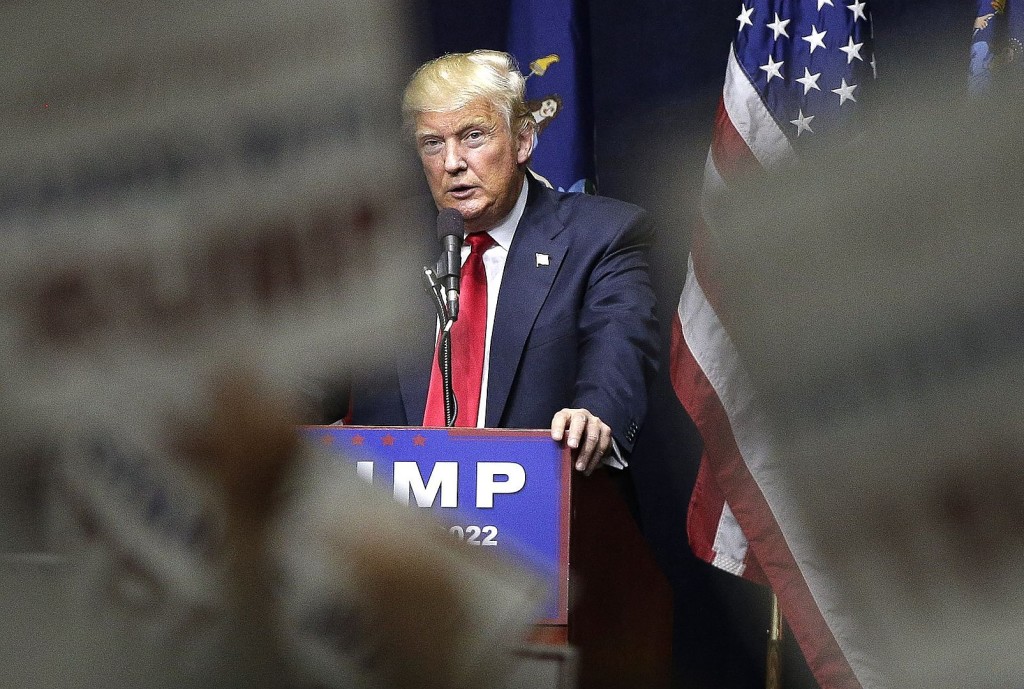
For Americans of nearly every race, gender, political persuasion and location, disdain for Donald Trump runs deep, saddling the Republican front-runner with unprecedented unpopularity as he tries to overcome recent campaign setbacks. Seven in 10 people, including close to half of Republican voters, have an unfavorable view of Trump, according to a new Associated Press-GfK poll. It’s an opinion shared by majorities of men and women; young and old; conservatives, moderates and liberals; and whites, Hispanics and blacks — a devastatingly broad indictment of the billionaire businessman. Even in the South, a region where Trump has won GOP primaries decisively, close to 70 percent view him unfavorably. And among whites without a college education, one of Trump’s most loyal voting blocs, 55 percent have a negative opinion. Trump still leads the Republican field in delegates and has built a loyal following with a steady share of the Republican primary electorate. But the breadth of his unpopularity raises significant questions about how he could stitch together enough support in the general election to win the White House. It also underscores the trouble he may still face in the Republican race, which appears headed to a contested convention where party insiders would have their say about who will represent the GOP in the fall campaign. “He’s at risk of having the nomination denied to him because grass-roots party activists fear he’s so widely disliked that he can’t possibly win,” said Ari Fleischer, a former adviser to President George W. Bush. Beyond their generally negative perception of Trump, large majorities also said they would not describe him as civil, compassionate or likable. On nearly all of these measures, Trump fared worse than his remaining Democratic or Republican rivals. Not that voters have all that much love for those rivals. But their negative perceptions don’t match the depth of the distaste for Trump. Texas Sen. Ted Cruz, who is seeking to catch Trump in the Republican delegate count, is viewed unfavorably by 59 percent, while 55 percent have negative views of Democratic front-runner Hillary Clinton. Another problem for Trump is that his public perception seems to be getting worse. The number of Americans who view him unfavorably has risen more than 10 percentage points since mid-February, a two-month stretch that has included some of his biggest primary victories but also an array of stumbles that suggested difficulties with his campaign organization and a lack of policy depth. A survey conducted by Gallup in January found Trump’s unfavorable rating, then at 60 percent in their polling, was already at a record high level for any major party nominee in their organization’s polling since the 1990’s. Candi Edie, a registered Republican from Arroyo Grande, California, is among those whose views on Trump have grown more negative. “At first, I thought he was great. He was bringing out a lot of issues that weren’t ever said, they were taboo,” Edie said. Now the 64-year-old feels Trump’s early comments masked the fact that he’s “such a bigot.” “I don’t know if he’s lost it or what,” she said. “He’s not acting presidential.”Trump’s unpopularity could provide an opening for Cruz, though he is loathed by many of his Senate colleagues and other party leaders. After a big win Tuesday in Wisconsin, Cruz is angling to overtake Trump at the July GOP convention. Clinton’s campaign believes Trump’s sky-high unfavorable ratings could offset some questions voters have about her own character, and perhaps even give her a chance to peel off some Republicans who can’t stomach a vote for the real estate mogul. Andrew Glaves, a “hard core” Republican from Bothell, Washington, said he might have to side with Clinton if Trump becomes the nominee, even though she’s out of step with his views on gun rights, his top election issue. “I’d be willing to take that as opposed to doing so much harm to the country’s reputation,” said Glaves, 29. More than 60 percent of all registered voters and 31 percent of Republicans said they definitely would not vote for Trump in the general election. One group that is still with him includes those who describe themselves as both Republicans and supporters of the tea party movement. Sixty-eight percent of them have a favorable view. Pennsylvania Republican Robert Paradis plans to vote for Trump in his state’s primary this month. The 76-year-old said that while Trump’s uneven temperament makes him cringe “all the time,” he’s hopeful the front-runner’s bluntness can shake up Washington. “He’s not a politician; he says it the way he feels it,” Paradis said. ___ The AP-GfK Poll of 1,076 adults was conducted online March 31-April 4, using a sample drawn from GfK’s probability-based KnowledgePanel, which is designed to be representative of the U.S. population. The margin of sampling error for all respondents is plus or minus 3.3 percentage points. Respondents were first selected randomly using telephone or mail survey methods and later interviewed online. People selected for KnowledgePanel who didn’t otherwise have access to the Internet were provided access at no cost to them. Republished with permission of the Associated Press.
Ted Cruz, Bernie Sanders emerge victorious in Wisconsin primaries
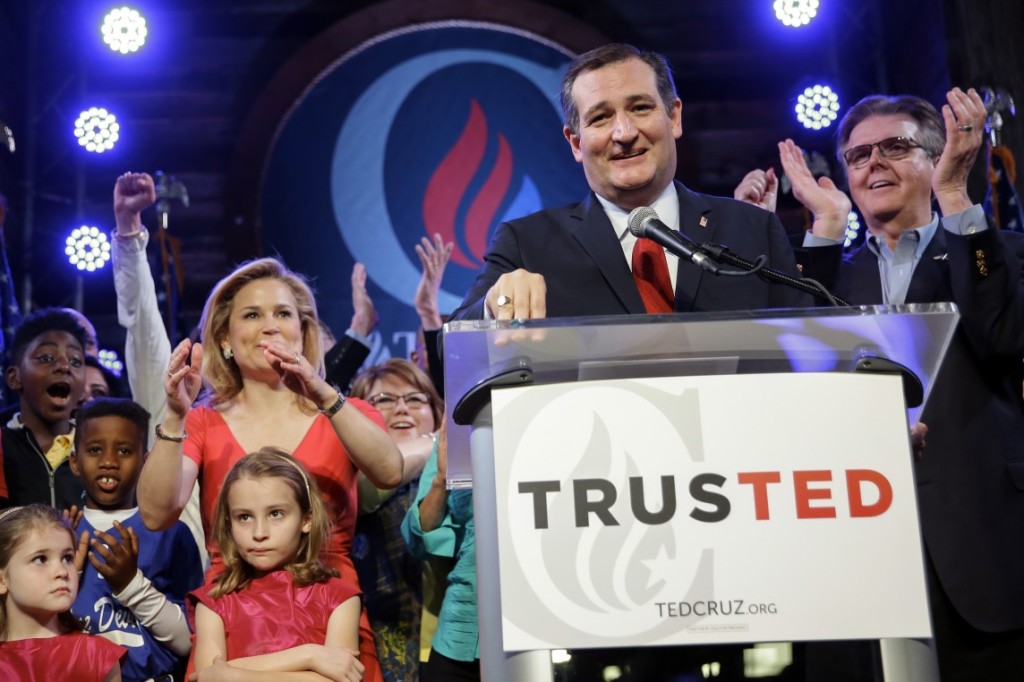
Republican Ted Cruz stormed to a commanding victory in Wisconsin Tuesday, denting front-runner Donald Trump‘s chances of capturing the GOP nomination before the party’s convention. Democrat Bernie Sanders triumphed over Hillary Clinton but still faces a mathematically difficult path to the White House. Trump’s defeat capped one of the worst periods of his campaign, a brutal stretch that highlighted his weaknesses with women and raised questions about his policy depth. While the billionaire businessman still leads the Republican field, Cruz and an array of anti-Trump forces hope Wisconsin signals the start of his decline. “Tonight is a turning point,” Cruz told cheering supporters at a victory rally. “It is a call from the hardworking people of Wisconsin to America. We have a choice. A real choice.” Cruz, a Texas senator with a complicated relationship with Republican leaders, also cast his victory as a moment for unity in a party that has been roiled by a contentious primary campaign. But Trump was unbowed. His campaign put out a biting statement: “Ted Cruz is worse than a puppet— he is a Trojan horse, being used by the party bosses attempting to steal the nomination from Mr. Trump.” Sanders’s sweeping win in virtually every county in Wisconsin, except Milwaukee, gives him greater incentive to keep competing against Clinton. But he still trails her in the pledged delegate count and has so far been unable to persuade superdelegates— the party officials who can back any candidate — to drop their allegiance to the former secretary of state and back his campaign. At a raucous rally in Wyoming, Sanders cast his victory as a sign of mounting momentum for his campaign. “With our victory tonight is Wisconsin, we have now won 7 out of 8 of the last caucuses and primaries,” he declared. The results in Wisconsin make it likely both parties’ primaries will continue deep into the spring, draping front-runners Trump and Clinton in uncertainty and preventing both from fully setting their sights on the general election. With an overwhelming white electorate and liberal pockets of voters, Wisconsin was favorable territory for Sanders. In a sign of Clinton’s low expectations in the Midwestern state, she spent Tuesday night at a fundraiser with top donors in New York City. Clinton congratulated Sanders on Twitter and thanked her supporters in Wisconsin. “To all the voters and volunteers who poured your hearts into this campaign: Forward!” she wrote. Sanders’ win will net him a handful of additional delegates, but he’ll still lag Clinton significantly. With 86 delegates at stake in Wisconsin, Sanders will pick up at least 44 and Clinton will gain at least 28. That means Sanders must still win 67 percent of the remaining delegates and uncommitted superdelegates in order to win the Democratic presidential nomination. While Trump has been the dominant force in the Republican race, he battled a series of campaign controversies in the lead-up to Wisconsin, including his campaign manager’s legal problems following an altercation with a female reporter and his own awkward stumbles in clarifying his views on abortion. Wisconsin’s Republican establishment, including Gov. Scott Walker, has also campaigned aggressively against the businessman. Exit polls in the state underscored the concerns about Trump that are surging through some corners of the Republican Party. A majority of Republican voters said they’re either concerned or scared of a potential Trump presidency. More than a third said they were scared about what Trump would do as president, and about 2 in 10 said they were concerned, according to surveys conducted by Edison Research for The Associated Press and television networks. The Texas senator was poised to collect most of Wisconsin’s 42 Republican delegates. Trump still has a narrow path to claim the nomination by the end of the primaries on June 7. But by losing Wisconsin, the real estate mogul has little room for error in upcoming contests. Complicating the primary landscape for both Cruz and Trump is the continuing candidacy of John Kasich. The Ohio governor’s only victory has come in his home state, but he’s still picking up delegates that could otherwise help Trump inch closer to the nomination or help Cruz catch up. To win a prolonged convention fight, a candidate would need support from the individuals selected as delegates. The process of selecting those delegates is tedious, and will test the mettle of Trump’s slim campaign operation. Cruz prevailed in an early organizational test in North Dakota, scooping up endorsements from delegates who were selected at the party’s state convention over the weekend. While all 28 go to the national convention as free agents, 10 said in interviews they were committed to Cruz. None has so far endorsed Trump. Despite the concern among some Wisconsin Republicans about Trump becoming president, nearly 6 in 10 GOP voters there said the party should nominate the candidate with the most support in the primaries, which so far would be Trump. Even among voters who favored Cruz, 4 in 10 said the candidate with the most support going into the convention should be the party’s nominee. Republished with permission of the Associated Press.
With New York primary ahead, Hillary Clinton digs into her past
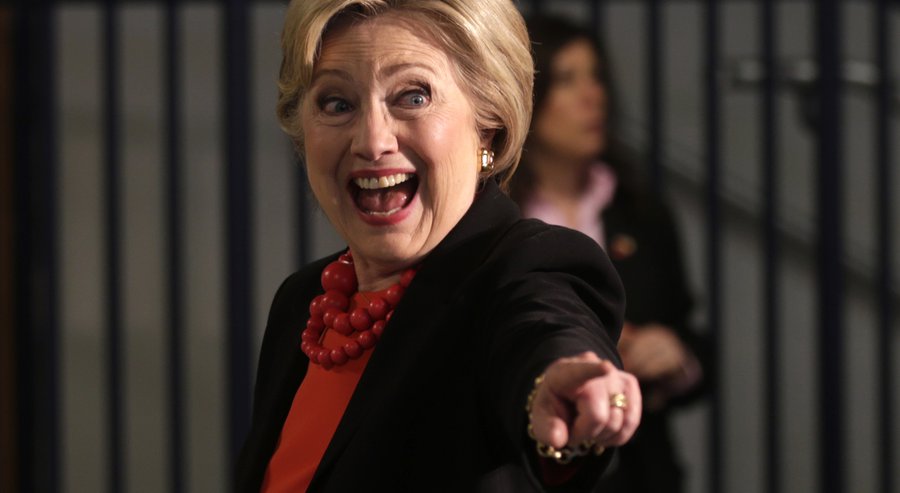
There was the old story about Corning, New York and the diesel buses. The one about the “soap lady” who built her business online with help from Hillary Clinton‘s Senate office. And don’t forget about the wine ice cream, discovered by the former New York senator and now sold across the globe. Most campaigns focus on the future. But when Clinton kicked off her effort to win over upstate New York, her sights were set squarely on the past. On Friday, she set off on a nostalgia-fused tour of her greatest economic hits, part of an effort by her campaign to highlight her congressional record as she prepares for a drag-out fight in her home state against Sen. Bernie Sanders. “When I think about the great honor I had of representing New York for eight years in the Senate, I want to put all that experience all that work on behalf of New York and America,” Clinton told cheering supporters gathered in a Syracuse warehouse. “This is really personal for me. You all took a chance on me back in 2000, and that meant the world to me,” she said. Clinton and her husband, former President Bill Clinton, will hold a series of events in upstate New York in the coming weeks, said campaign aides, designed to boost support among rural and working-class voters, groups that have favored Sanders in previous primary contests. On Friday, she unveiled a $10 billion manufacturing proposal centered on using federal funding to create “Make it in America Partnerships.” Businesses participating in the program would pledge not to outsource jobs or move their headquarters abroad to avoid paying U.S. taxes. The new federal spending would be paid for with tax revenue from a “clawback” tax on companies that outsource jobs or facilities abroad, an idea Clinton proposed in March. But even as she rolled out her new policy, Clinton’s seemed to delight in discuss the past. Joined by a top staffer from her Senate office, she reminisced about projects like helping pair New York winemakers with ice cream producers to create wine ice cream. And she was happy to take suggestions from her old friends, including soliciting Hollywood remake of the 1980s movie Flashdance to make manufacturing “sexy.” “Gotta make it sexy, I agree with that,” Clinton said. “We’ve got to lift up those jobs and have some TV shows about them.” While a loss in New York would not significantly winnow her advantage among the delegates who determine the nomination, it would be a major psychological blow to her supporters and raise questions about the level of enthusiasm within her own party for her bid. Clinton hopes that big wins in New York and the contests that follow in five northeastern states a week later will effectively end the Democratic primaries by giving her an all-but-insurmountable delegate lead. Along with touting her local record, she’s sharpening her attacks on Sanders, questioning his support for gun control legislation and saying his free college proposal would require governors to pay a significant share of the cost, an unlikely outcome in Republican-led states. She targeted his opposition to the export-import bank on Friday, a federal agency that providing financing for exports to help U.S. companies sell goods overseas. “I just go crazy when I hear Senator Sanders and the tea party Republicans railing against the export-import bank like it’s some kind of evil presence,” she said. “It gives us an advantage.” Sanders, who grew up in Brooklyn, is targeting younger liberals in New York City and working class voters in economically-struggling areas upstate. He kicked off his campaign in the state on Thursday night, attracting 18,500 cheering supporters to a rally in the South Bronx. On Friday, he campaigned in Wisconsin, where he’s favored to win the April 5 primary. Republished with permission of the Associated Press.
Donald Trump: Is he the quintessential Florida Man?

Donald Trump drew thousands to his rallies around the Sunshine State, basking in their adoration, his face glowing like a Florida orange as he anticipated victory. “Florida loves Trump, and I love Florida, so I think I’m going to win Florida,” he repeated. Trump did win Florida on Tuesday, claiming victory with the bravado of someone who survived a particularly hellish South Florida commute. The only actual Floridian in the race — Marco Rubio, a Cuban-American born in South Florida who earned all his degrees from Florida universities — failed to make his case, and Trump had already squashed the hopes of the GOP’s other Florida candidates like so many palmetto bugs. Former Gov. Jeb Bush, who was supposed to have this thing locked up before the Southern primaries, flamed out shortly after he finally tried to find Trump’s jugular by labeling him “the chaos candidate.” Ben Carson, who lives in a West Palm Beach mansion, finally quit, too, and endorsed Trump. Somehow, it’s Trump who captured Republican hearts in what some consider America’s strangest state. Trump made his name in New York City, displaying “New York values” with a brash, fast-talking, larger-than-life persona. But really, when you think about it, Donald Trump is the quintessential Florida Man. “He embodies the Florida dream: the idea of a better life,” says historian Gary Mormino. All the things people fantasize about in the frigid north — a beachfront mansion and endless riches to spend on endless rounds of golf — Trump has it and more, right here in Florida. And he doesn’t just live the Florida lifestyle — he’s a Sunshine State soul mate. “Trump is more casual, more flippant, less buttoned up, just like Floridians,” says Paul George, a history professor at Miami-Dade College. But what about Rubio, the actual Floridian who dropped out of the race after Tuesday night’s crushing loss? Rubio seems youthful and has a vision for America, but “comes off as restrained,” George says, “much more buttoned up, which is ironic, since he’s from Florida.” Like each winter’s snowbirds and two-thirds of state residents, Trump is from outside Florida. But he plays and does business here. In 2010, he launched a multilevel marketing company that sold vitamins to an adoring crowd of thousands in Miami. Earlier this month, after 2012 GOP nominee Mitt Romney declared that “a business genius he is not,” Trump summoned the media to his Trump National Golf Course in Jupiter. “He’s an empire builder, and Floridians, especially South Floridians, are empire builders,” says George. “Or they dream of building an empire.” While his Trump Tower penthouse in New York imitates the Palace of Versailles, his most famous home has been Mar-a-Lago. In 1985, he paid $10 million for the 58-bedroom Mediterranean revival mansion with a 20-acre oceanfront estate straddling Palm Beach Island. Trump and his third wife, Slovenian model Melania Knauss, held their wedding reception at Mar-a-Lago, which Trump had turned into a high-end club, much to the consternation of his traditional Palm Beach neighbors. “Trump’s Palm Beach Club Roils the Old Social Order” was the headline on The Wall Street Journal story. That’s another Florida Man attribute: roiling the social order. Trump’s been doing it for years. Mormino, a professor emeritus at the University of South Florida-St. Petersburg, points out Trump bought into Palm Beach when national ads by the tourism bureau proclaimed: “Florida. The rules are different here.” That could almost be Trump’s campaign slogan, no? Take his four corporate bankruptcies: No big deal in Florida, which trails only California in bankruptcy filings. Or his marriages: 7 percent of Florida’s men have married three or more times, like Trump. The national average is 5 percent, according to the Pew Research Center. Or the fact he has made and lost fortunes in real estate. Floridians still gamble on slices of sunshine, despite the last housing bust. “Trump’s got the Florida values and Florida lifestyle down,” says George. Trump’s brand was nicked by a failed condo project in Tampa, but that, too, was classic Florida. Trump boasted in 2005 the 52-story Trump Tower Tampa would be “a signature landmark property so spectacular that it will redefine both Tampa’s skyline and the market’s expectations of luxurious condominium living.” Two years later, Trump sued for $1 million in unpaid licensing fees, the developer went bankrupt, and buyers who put 20 percent down on a tower that was never built were out tens of thousands of dollars. “Trump was like the Pied Piper who led us all into it, trusting him that he wouldn’t put his name on something bad,” said Mary Ann Stiles, a Tampa attorney who lost $100,000 on the deal. Ah, but no one wants to dwell on the bad here. They’d rather play — preferably under the cool shade of a palm tree — like golfers and presidents John F. Kennedy and Richard Nixon did when they set up their Winter White Houses in Florida. Trump has three world-class golf courses in Florida — Doral, Palm Beach and Jupiter. He invested hundreds of millions into Doral after rescuing it from bankruptcy, and the course has been a popular PGA Tour stop since 1962. But golf-watchers say this run is threatened by Trump’s remarks: the PGA canceled its Grand Slam of Golf at Trump’s course in Los Angeles after his comments disparaging Mexican immigrants, and Doral could be next. Trump-haters may seek solace in this tidbit that Mormino pointed out: No Florida man has ever been elected president. Republished with permission of The Associated Press


